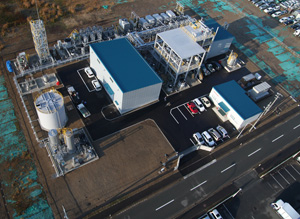Kawasaki Establishes Technology for Low-cost Production of Bioethanol from Non-food Biomass
May 30, 2013

Tokyo, May 30, 2013 — Kawasaki Heavy Industries, Ltd. announced today that it has established a new technology for the low-cost production of bioethanol from rice straw, a non-food source of biomass. Kawasaki recently completed a related manufacturing test it was working on as part of the Ministry of Agriculture, Forestry and Fisheries (MAFF) soft cellulose utilization project.
This project was offered for public bidding by the MAFF with the aim of establishing a new technology for the production of biofuel from rice straw and other non-food soft cellulose biomass that has hitherto remained untapped as resources. Under the full cooperation of Akita Prefecture, Kawasaki has pursued this project with the Akita Agriculture Public Corporation over a period of five years starting in fiscal 2008.
In the recently completed test, Kawasaki used a new hydrothermal technique to saccharify cellulose in the process of producing bioethanol. The existing technique requires the use of sulfuric acid and enzymes in the saccharification process, and therefore cost was a major issue. With Kawasaki's new technique, however, this process can be completed without sulfuric acid treatment, making it an excellent alternative in terms of the environment and economic efficiency. Further, by changing the hydrothermal condition, this technique can be applied to convert soft cellulose other than rice straw into sugar.
Kawasaki designed and constructed a demonstration plant with a daily production capacity of 200 liters in Katagami City, Akita Prefacture, in November 2009. In October of the following year, Kawasaki successfully completed a driving test of a vehicle running on bioethanol pruduced at the plant. Subsequently, the plant was continuously operated through the entire process of pretreatment, saccharification, fermentation, distillation and dehydration to demonstrate the ability to manufacture a stable supply of bioethanol compliant with JIS*. As a result, Kawasaki completed a technology for the production of bioethanol on a commercial scale at a cost of 40 yen per liter.
Bioethanol is attracting increasing attention as a cleaner alternative to fossil fuels. While a technology to produce bioethanol from food sources such as grain and starch are already in use around the world, with fear of a global food shortage increasing, establishment of new techniques to produce bioethanol from non-food sources such as rich straw is urgently called for.
Kawasaki will continue to develop and market new technologies that promote the effective utilization of renewable energy sources, thereby contributing to the reduction of greenhouse gas emissions and the creation of a recycle-based society through effective utilization of resources.
- *
- JIS: A standard stipulating quality-related matters and testing methods concerning ethanol fuel to be used for automobile gasoline.
- *2
- Producing cost: The cost stated above for producting ethanol from rice straw does not include the cost for collecting and transporting rice straw, fuel cost for powering the biomass boiler, and depreciation expenses for the manufacturing equipment.
| Soft Cellulose Utilization Project Structure Cooperation | |
|---|---|
| Kawasaki Heavy Industries, Ltd.: | Bioethanol production, driving test of a 100% ethanol-based vehicle |
| Akita Agriculture Public Corporation: | Collection and transportation of rice straw |
| Overview of Bioethanol Manufacturing Demonstration Facility | |
|---|---|
| Plant site: | Showa Industrial Park, Katagami City, Akita Prefecture |
| Production capacity (max): | 200 liters/day |
| Site area: | 4,800 m2 (80 m x 60 m) |
| Produced bioethanol concentration: | 99.5 vol% |
Contact
If you need more information about our business,
please feel free to contact us.





